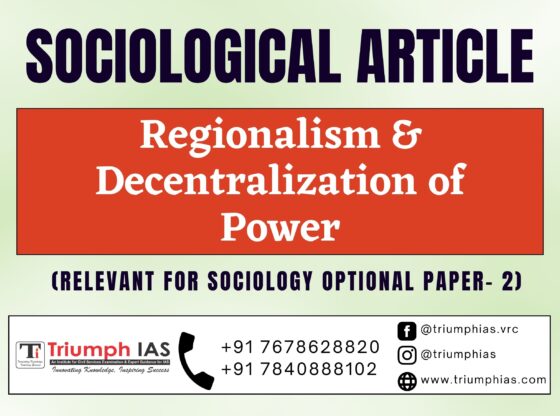Regionalism & Decentralization of Power
Relevant for sociology optional Paper- 2 (Unit- 13 : Social Changes in India)

Regionalism and decentralization of power are two concepts that are closely related to the political and administrative structure of a country. Regionalism is the idea that a country is divided into regions, each with its own unique culture, language, and history, and that these regions should have greater autonomy in decision-making and governance. Decentralization of power, on the other hand, refers to the process of transferring power and decision-making authority from central government to local or regional governments.
In India, regionalism and decentralization of power have been important issues for many years. India is a country with great diversity in terms of culture, language, and ethnicity. There are 28 states and 8 Union territories in India, each with its own unique identity and history. The Constitution of India recognizes this diversity and provides for the formation of states and union territories.
Regionalism in India is primarily based on language. The demand for separate states based on linguistic identity began soon after independence. The first state to be formed on linguistic lines was Andhra Pradesh in 1953. Since then, several other states have been formed on the basis of language, such as Tamil Nadu, Karnataka, and Maharashtra. The demand for separate states based on ethnicity, religion, and geography has also been made in certain parts of the country, such as Telangana, Gorkhaland, and Bodoland.
The demand for regional autonomy has been fueled by several factors. One of the main factors is the perception that the central government is dominated by a single language and culture, which has led to neglect of the interests and needs of other regions. This has created a sense of alienation and resentment among the people of these regions. The demand for regional autonomy is also fueled by the desire to preserve and promote the cultural and linguistic identity of the region.
Decentralization of power has also been an important issue in India. The Constitution of India provides for a federal system of government, with powers divided between the central government and the state governments. However, the central government has often been accused of encroaching upon the powers of the state governments, leading to a centralization of power. The demand for greater decentralization of power has been made in order to ensure that the needs and aspirations of the people at the local level are addressed.
The benefits of regionalism and decentralization of power are many. Regionalism can promote a sense of pride and identity among the people of a region, and can help to preserve and promote the unique culture and language of the region. Decentralization of power can help to ensure that the needs and aspirations of the people at the local level are addressed, and can lead to greater efficiency and accountability in governance.
However, there are also potential drawbacks to regionalism and decentralization of power. One of the main drawbacks is the potential for fragmentation and disunity. If regions are given too much autonomy, there is a risk that they may become too focused on their own interests and neglect the interests of the country as a whole. Decentralization of power can also lead to a lack of uniformity in policies and regulations across the country, which can create confusion and inefficiencies.
In India, the issue of regionalism and decentralization of power has been a contentious one. The central government has often been accused of neglecting the interests of certain regions, and of encroaching upon the powers of the state governments. The demand for greater autonomy and decentralization of power has been made by several states, particularly those in the northeast and south of the country.
The Indian government has taken several steps to address the issue of regionalism and decentralization of power. The formation of new states based on linguistic identity has been one such step. The government has also established several bodies, such as the Inter-State Council and the National Development Council, to promote greater cooperation and coordination between the central and state governments.
Another step taken by the Indian government towards decentralization of power is the implementation of the Panchayati Raj system. This is a system of local self-government in which power is transferred to the village level. The system has been in place since the 1990s and has been successful in promoting grassroots democracy and empowering local communities.
Despite these steps, the issue of regionalism and decentralization of power remains a contentious one in India. The demand for greater autonomy and decentralization of power is likely to continue, particularly in regions that feel neglected or marginalized by the central government. It is important for the government to continue to address these issues and to ensure that the needs and aspirations of all regions are addressed.
In conclusion, regionalism and decentralization of power are important concepts that have significant implications for the political and administrative structure of a country. In India, regionalism has primarily been based on language, while decentralization of power has been a contentious issue between the central and state governments. While there are potential drawbacks to these concepts, they can also bring significant benefits, such as promoting a sense of identity and empowering local communities. The Indian government has taken several steps towards addressing these issues, but the demand for greater autonomy and decentralization of power is likely to continue. It is important for the government to continue to address these issues and to ensure that the needs and aspirations of all regions are addressed.
For more such free UPSC notes, Articles, News & Views Join our Telegram Channel. https://t.me/triumphias
Click the link below to see the details about the UPSC – Civils courses offered by Triumph IAS. https://triumphias.com/pages-all-courses.php


